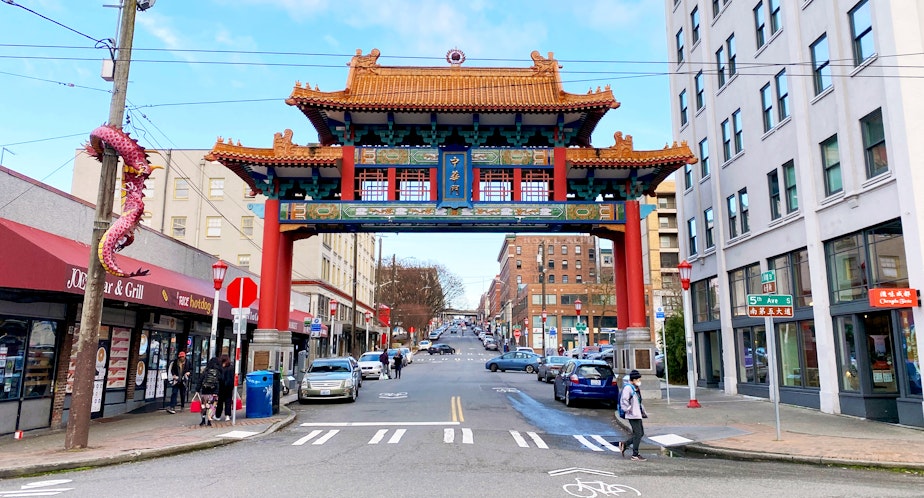Seattle’s Chinatown-International District designated 'endangered historic place.' Will that help the neighborhood?

Seattle's Chinatown-International District is among the 11 most endangered historic places in the U.S., according to a new list from the National Trust for Historic Preservation.
The listing doesn’t provide any protections, but Huy Pham, programs director for the Washington Trust for Historic Preservation, said it helps raise awareness about the neighborhood, especially as it’s being eyed for a major transit hub.
“This call to action is saying that the Asian American community, and those who care about the historic and cultural relevance of this district, aren't just going to let the same thing happen over and over,” Pham said.
Decades ago, the construction of highways and stadiums had a significant impact on the Seattle neighborhood and those who call the Chinatown-International District home. Now, plans for a new light-rail station could once again disrupt the community and impact businesses with ongoing construction, diverted traffic and closed sidewalks.
Betty Lau grew up in the neighborhood and is part of the advocacy group Transit Equity for All. She saw firsthand the impact of the I-5 construction in the 1960s, which split the neighborhood in two and displaced Lau's childhood church. That disruption was followed by the construction of the Kingdome in the 1970s and then Safeco Field in the 1990s.
She spoke Tuesday at Hing Hay Park during an announcement of the neighborhood's new designation as "most endangered." Lau said she wants transit and city government to be more collaborative with the community when talking about the potential light rail development.
Sponsored
“No one sat down to talk, to prep us, to talk to us,” she said. “We're asking that they put into practice the principles of equity, inclusion, collaboration, all the things that they have entire departments for, that we have never heard from.”
Rachelle Cunningham, a spokesperson for Sound Transit, said transit officials did engage with community groups, businesses, and residents, and will continue to do so. They regularly hold public meetings.
“The Sound Transit Board identified the North of CID and South of CID stations as part of the preferred alternative for the Ballard Link Extension project," she said. "This indicates the Board’s preference at this time, but is not the final decision.”
RELATED: '11 Most Endangered Historic Places' in the U.S.
Sound Transit still has to complete an Environmental Impact Survey before they make the final decision on where the new station will go. During that time Cunningham said transit officials will continue engaging with community members.
Aolani Chan started working as a tour guide for the Wing Luke Museum a little more than a year ago after moving into the Chinatown-International District. Chan attends a nearby university.
Sponsored
They said when people talk about future developments and plans for the neighborhood, language access is one of the barriers that gets in the way of connecting to the community.
“It is just easier to go to someone else who is fluent in English but may not have as deep of a connection with the community,” Chan said.
On the Sound Transit website, there's an option to translate the entire webpage into different languages, but all accessible agendas, and pdf files are in English.
Chan sees a future where people want to learn more about the history of the Chinatown-International District and want to see the small businesses operating in the neighborhood bloom and flourish. They also do not want to see outside developers come in and gentrify the area.
For now, Chan sees the Chinatown-International District's inclusion on a list of endangered historic places as an affirmation of the work that still needs to be done.
Correction notice, 12:20 p.m. on Wednesday, 5/10/23: A previous headline for this story incorrectly stated that the Chinatown-International District's "endangered historic place" designation was given by the federal government. The designation was made by the nonprofit National Trust for Historic Preservation, which is not a government entity.




